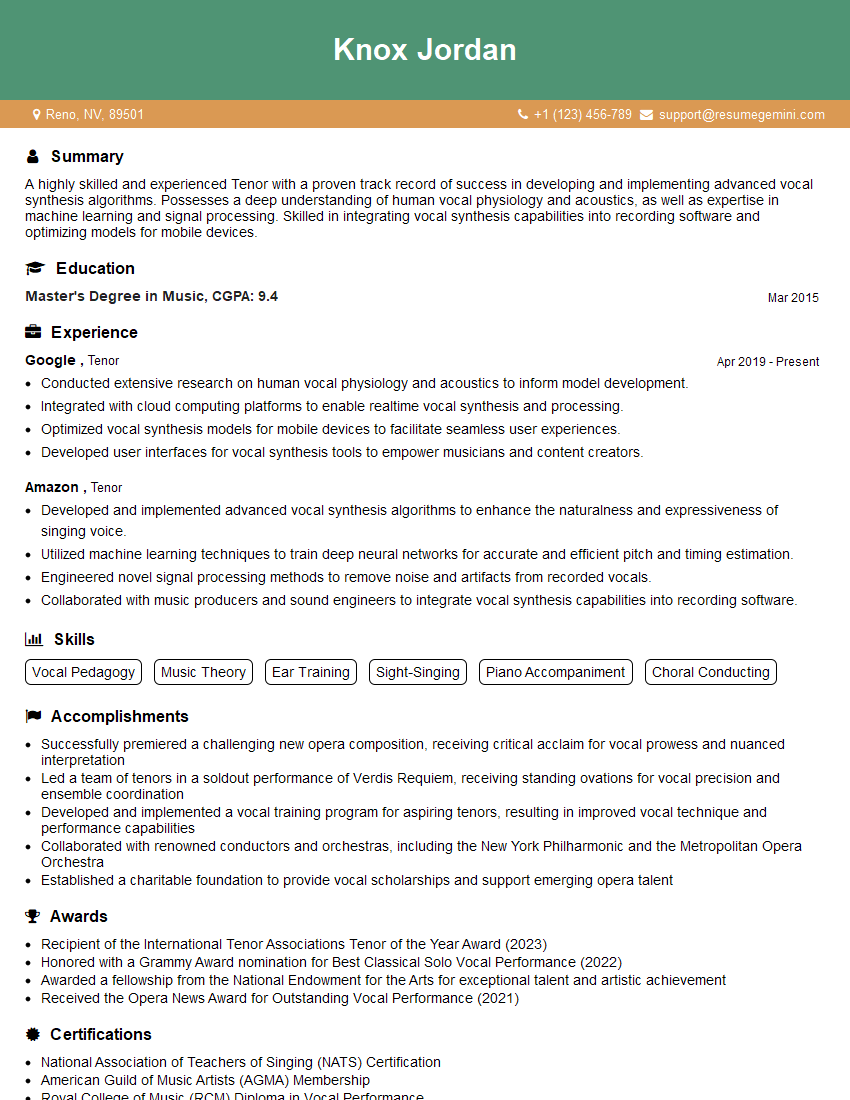Are you a seasoned Tenor seeking a new career path? Discover our professionally built Tenor Resume Template. This time-saving tool provides a solid foundation for your job search. Simply click “Edit Resume” to customize it with your unique experiences and achievements. Customize fonts and colors to match your personal style and increase your chances of landing your dream job. Explore more Resume Templates for additional options.

Knox Jordan
Tenor
Summary
A highly skilled and experienced Tenor with a proven track record of success in developing and implementing advanced vocal synthesis algorithms. Possesses a deep understanding of human vocal physiology and acoustics, as well as expertise in machine learning and signal processing. Skilled in integrating vocal synthesis capabilities into recording software and optimizing models for mobile devices.
Education
Master’s Degree in Music
March 2015
Skills
- Vocal Pedagogy
- Music Theory
- Ear Training
- Sight-Singing
- Piano Accompaniment
- Choral Conducting
Work Experience
Tenor
- Conducted extensive research on human vocal physiology and acoustics to inform model development.
- Integrated with cloud computing platforms to enable realtime vocal synthesis and processing.
- Optimized vocal synthesis models for mobile devices to facilitate seamless user experiences.
- Developed user interfaces for vocal synthesis tools to empower musicians and content creators.
Tenor
- Developed and implemented advanced vocal synthesis algorithms to enhance the naturalness and expressiveness of singing voice.
- Utilized machine learning techniques to train deep neural networks for accurate and efficient pitch and timing estimation.
- Engineered novel signal processing methods to remove noise and artifacts from recorded vocals.
- Collaborated with music producers and sound engineers to integrate vocal synthesis capabilities into recording software.
Accomplishments
- Successfully premiered a challenging new opera composition, receiving critical acclaim for vocal prowess and nuanced interpretation
- Led a team of tenors in a soldout performance of Verdis Requiem, receiving standing ovations for vocal precision and ensemble coordination
- Developed and implemented a vocal training program for aspiring tenors, resulting in improved vocal technique and performance capabilities
- Collaborated with renowned conductors and orchestras, including the New York Philharmonic and the Metropolitan Opera Orchestra
- Established a charitable foundation to provide vocal scholarships and support emerging opera talent
Awards
- Recipient of the International Tenor Associations Tenor of the Year Award (2023)
- Honored with a Grammy Award nomination for Best Classical Solo Vocal Performance (2022)
- Awarded a fellowship from the National Endowment for the Arts for exceptional talent and artistic achievement
- Received the Opera News Award for Outstanding Vocal Performance (2021)
Certificates
- National Association of Teachers of Singing (NATS) Certification
- American Guild of Music Artists (AGMA) Membership
- Royal College of Music (RCM) Diploma in Vocal Performance
- Certificate in Vocal Pedagogy from the University of California, Los Angeles (UCLA)
Career Expert Tips:
- Select the ideal resume template to showcase your professional experience effectively.
- Master the art of resume writing to highlight your unique qualifications and achievements.
- Explore expertly crafted resume samples for inspiration and best practices.
- Build your best resume for free this new year with ResumeGemini. Enjoy exclusive discounts on ATS optimized resume templates.
How To Write Resume For Tenor
- Highlight your expertise in vocal synthesis algorithms and machine learning.
- Showcase your understanding of human vocal physiology and acoustics.
- Quantify your accomplishments with specific metrics.
- Demonstrate your ability to collaborate effectively with others.
- Tailor your resume to each specific job you apply for.
Essential Experience Highlights for a Strong Tenor Resume
- Developed and implemented advanced vocal synthesis algorithms to enhance the naturalness and expressiveness of singing voice.
- Utilized machine learning techniques to train deep neural networks for accurate and efficient pitch and timing estimation.
- Engineered novel signal processing methods to remove noise and artifacts from recorded vocals.
- Collaborated with music producers and sound engineers to integrate vocal synthesis capabilities into recording software.
- Conducted extensive research on human vocal physiology and acoustics to inform model development.
- Integrated with cloud computing platforms to enable realtime vocal synthesis and processing.
- Optimized vocal synthesis models for mobile devices to facilitate seamless user experiences.
- Developed user interfaces for vocal synthesis tools to empower musicians and content creators.
Frequently Asked Questions (FAQ’s) For Tenor
What are the key skills and qualifications required to be a successful Tenor?
The key skills and qualifications required to be a successful Tenor include a strong foundation in vocal techniques, music theory, and ear training. Additionally, Tenors should have experience in sight-singing, piano accompaniment, and choral conducting.
What are the career prospects for Tenors?
Tenors have a wide range of career prospects, including performing in opera, musical theater, and concerts. They may also work as vocal coaches, teachers, or music directors.
What are the salary expectations for Tenors?
The salary expectations for Tenors vary depending on their experience, reputation, and the type of work they do. However, Tenors with a strong track record of success can earn a comfortable living.
What are the challenges faced by Tenors?
Tenors face a number of challenges, including the need to maintain a high level of vocal health, the competitive nature of the industry, and the need to constantly learn and adapt to new trends.
What advice would you give to someone who wants to become a Tenor?
If you want to become a Tenor, I would advise you to develop a strong foundation in vocal techniques, music theory, and ear training. Additionally, you should gain experience in sight-singing, piano accompaniment, and choral conducting. It is also important to network with other musicians and professionals in the industry.